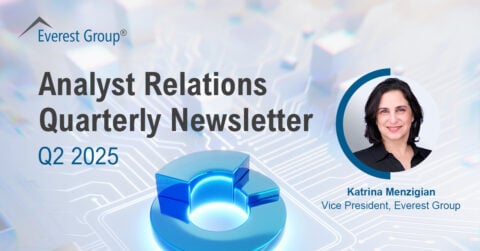
GAIA-X Summit 2020: Key Takeaways and the Future of Data Sovereignty in Europe
In an earlier blog on sovereign cloud, we explained how GAIA-X – an ambitious project led by France and Germany, aimed at creating a high-performance and trustworthy data infrastructure for Europe – is set to play a pivotal role in the evolution of the European cloud market in the coming years. Since then, GAIA-X has experienced a significant increase in the number of member firms, cutting across geographies and industry verticals, in its endeavor to secure data sovereignty.
We participated in the GAIA-X summit, which was held virtually on November 18 and 19, 2020, and highlighted the increasing relevance of GAIA-X both within and outside Europe and for the broader Industry 4.0 agenda. Here are some of the notable insights from the summit.
GAIA-X has experienced a significant increase in member firms and countries – including non-European countries
GAIA-X was launched with 22 member firms (11 French, 11 German) and an initial focus on France and Germany, but, within one year, the project has grown into a colossal multi-industry project with over 181 members from 18 countries.
Notably, on October 15, 2020, all 27 European member states signed a joint declaration supporting the European Commission’s cloud and data strategy, which mentioned GAIA-X as a leading example of a public-private initiative for European-federated data infrastructure.
Economists believe GAIA-X will create long-term economic benefits for Europe
The GAIA-X project is expected to reap benefits for European countries in the long run, as several economists, including the likes of Jacques Cremer, have placed their bets on a better data sharing platform that reduces transaction costs. The key ways in which GAIA-X can help improve the European economy are:
- Better data sharing platforms will result in quality AI training data and, thus, a better AI-enabled infrastructure, propelling more automation and cost savings
- It will reduce codependence among subcontractors by curbing the use of proprietary data exchange methodologies
GAIA-X will help better implement European compliance laws
Compliance and data sovereignty are some of the key goals of the GAIA-X project, and the project is expected to address some of these challenges related to European laws. As it is designed on the core European values of openness, transparency, and collaboration, GAIA-X is expected to better implement European laws along with the draft European Data Governance Act, which will play a crucial role in defining data flows in Europe.
GAIA-X can play a key role in enabling infrastructure for Industry 4.0
Industries in Europe are in a transformative state, with increasing emphasis on data access, data security, and data sovereignty. The next step in IoT is AI-enabled IoT (AIoT), and industry experts are confident that GAIA-X will enable the data infrastructure needed for this transformation.
Several potential use cases across multiple data ecosystems – within and outside Europe
GAIA-X already has use cases across multiple industries and sectors, including finance, health, public sector, agriculture, energy, mobility, smart living, and Industry 4.0. Some of these use cases include collaborative condition monitoring, shared production, financial big data clusters, smart health connect, smart infrastructure management, digital parking management, and agricultural ecosystem, among many others.
Cloud adoption in Europe will increase through a collaborative data ecosystem
A key value proposition of GAIA-X is a collaborative data ecosystem that can help build a structure with innovation at its core. GAIA-X aims to increase cloud usage in the EU from 24% to 60% in the coming years by developing common standards with other cloud providers that will accelerate market uptake and simultaneously enhance data portability.
Strong financial support for GAIA-X to help the EU tackle data sovereignty and data privacy challenges
The German government is planning to make EUR200 million available for GAIA-X, while the EU is planning to invest EUR2 billion in the digital transformation space, some of which will find its way to the GAIA-X project.
With access to these funds, GAIA-X will emerge as a strong contender for hyperscalers in Europe and will impact the overall cloud market. The GAIA-X roll-out will further help the EU address the core issues of data privacy and data sovereignty – which have long been a challenge.
Consolidating successes and looking ahead
We believe that GAIA-X has experienced significant growth in the last year, primarily for the following reasons:
- The project has a strong legal framework with open source software promoting transparency
- Companies across industries have committed to it
- It is starting to build a strong customer base with use cases identified, again across industries
We expect GAIA-X to continue its momentum in 2021, driven by the European Data Governance Act and constant legal battles between US tech giants, such as Facebook, Google, and Apple, and the EU. The project also plans to launch six regional hubs by the end of 2020, while another six are in the pipeline for the first half of 2021. These regional hubs will act as entry points for anyone who wants to use GAIA-X and will further strengthen GAIA-X’s data sovereignty proposition, even as more firms and countries hop on the GAIA-X bandwagon.
If you’d like to know more about the GAIA-X project or have any questions or observations, please write to us at [email protected] or [email protected].











